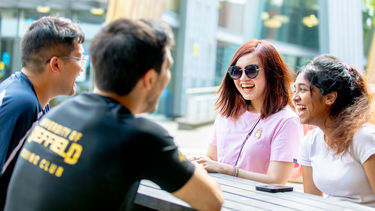Case study of the MEng Materials Science and Engineering (MATU39)
Overview and outcomes of the MEng Materials Science and Engineering project to embed IDL.
Overview
The Libraryâs support for Materials Science and Engineering undergraduate students had, in the past, predominantly taken the form of face-to-face induction sessions at the start of each academic year.
The aim of this project was to collaboratively explore how and where Library content and information and digital literacy (IDL) could be effectively embedded in the virtual learning environment for Materials Science and Engineering students.
After exploring the IDL resources and Library content available to Materials Science and Engineering students and learning about the different digital learning tools that could be used to embed these in the programme, James reflected upon each of the modules in his programme to identify where, when, and how it would be most effective and appropriate to embed IDL and Library content.
The project team met several times throughout the project with representatives from the department, which provided further insight into the programme level approach being developed for the Materials Science and Engineering programme and gaining staff input into how Library content and IDL could most effectively be embedded within this.
Outcomes
There have been a number of positive outcomes from the work undertaken:
-
Raised awareness of information and digital literacy (IDL) support available to department to support their work on programme level approach.
-
has been linked from every Blackboard module for the Materials Science and Engineering programme.
-
IDL resources have been embedded in specific Blackboard courses at the point of student need, specifically:
-
MAT320/405 tutorials: and databases; ; and referencing guides; , , and Adobe Photoshop guidance via LinkedIn Learning.
-
MAT1820 tutorials: and , and and referencing guides.
-
-
Work will continue in the coming academic year to explore embedding the following IDL resources into the department's UG tutorials with personal tutors: ; and referencing guides; .
-
The Library and Digital Learning Team will work with colleagues in Materials Science and Engineering to explore using the IDL reflection template and reflective portfolio during UG tutorial sessions.
-
Staff within Materials Science and Engineering are piloting the IDL Quickmarks set in to enrich assessment feedback and enable students to further develop their IDL.
-
Library IDL resources have been added in the Blackboard content collection and Kaltura shared repository.
Reflections
James Nohl, Library Student Associate
The way in which reading had been delivered to us was varied between modules. Some reading lists were populated with the core reading, others did not utilise the reading lists, [but] consistently reading was referred to in lecture slides.
We saw that the reading lists could reflect what was given in lecture slides and perhaps students would utilise or follow up on reading more often if it was accessible [via a reading list] and took them straight through the StarPlus service which we are very acquainted with.
Giving [the subject guide] more visibility might help students explore the resources offered by the Library and also it gives them more consistency between the modules in how the Library content is embedded. Students will see the value of resources that are provided at the right time and the right place.
The reflective portfolio will make students more aware of their IDL skills, the universityâs IDL framework and prompt them to use these resources to develop their IDL skills.
Pete Mella, Digital Learning Advisor
This project showed that students find the Library's IDL resources very useful, but they often don't know about them at the right time.
They can be surfaced much more effectively at the point when the respective skills are required during their courses, and work that came out of this project, such as QuickMarks and the IDL area of the Content Collection, can help tutors find and deploy them more easily.
Tutors also provide very good information, but in inconsistent ways on the VLE that often do not utilise useful features such as the reading lists.
Consistency within a programme on core information can reduce students' time and confusion when navigating their Blackboard courses.

International scholarships
We offer a generous package of financial support for international students, including undergraduate and postgraduate taught scholarships worth £10,000 towards the annual tuition fee.
Applications are open for existing offer holders for programmes starting in autumn 2025.
